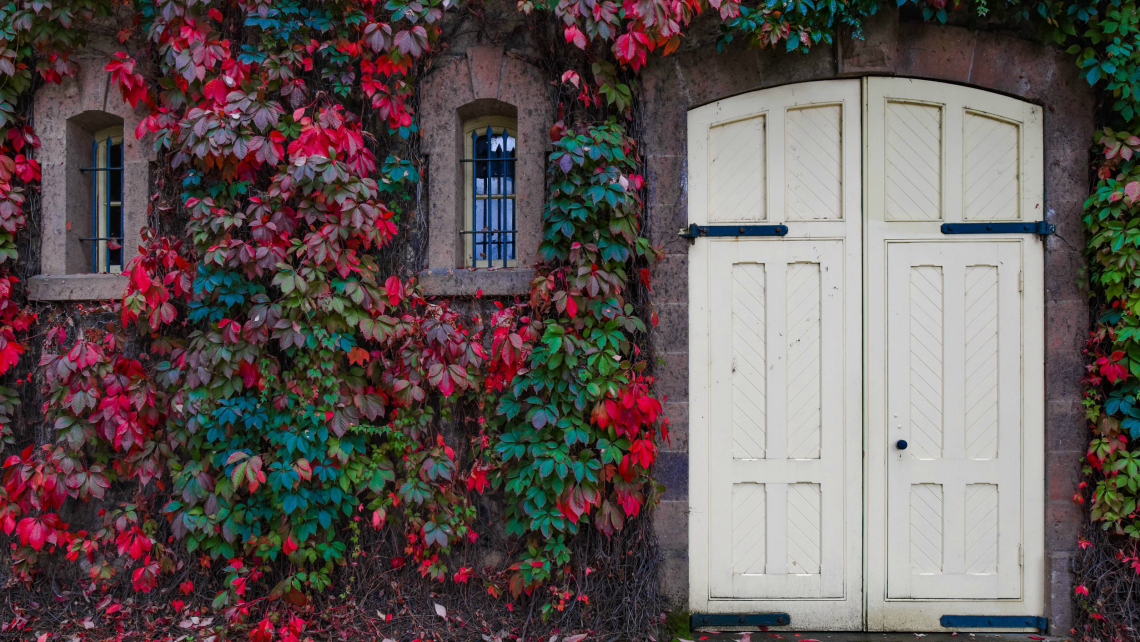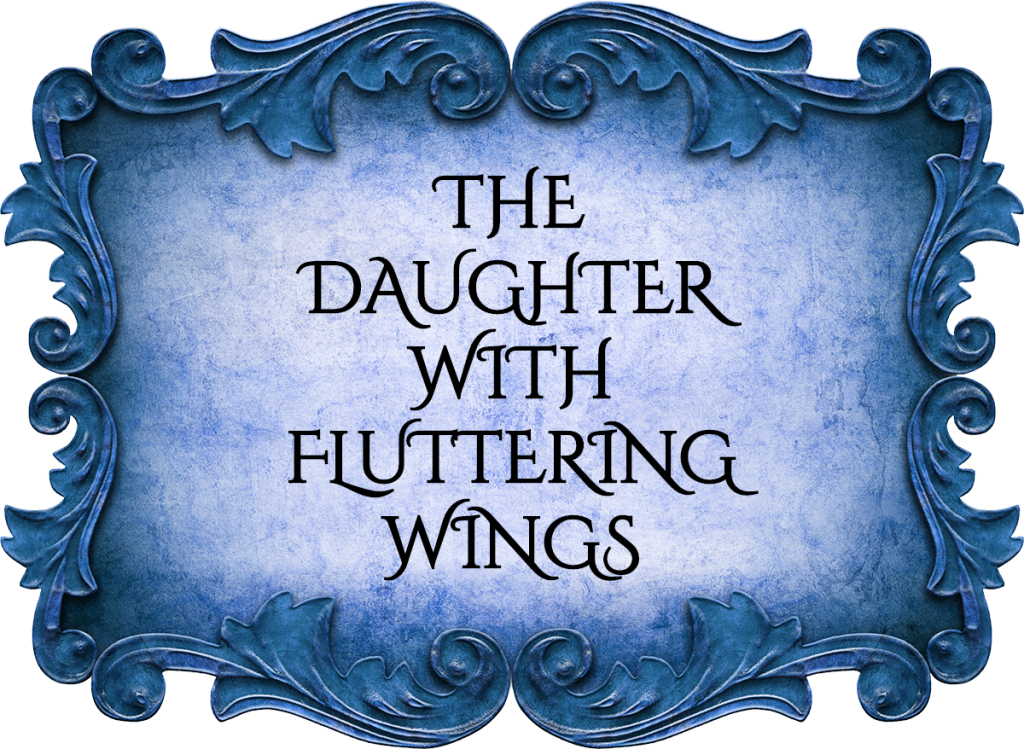
The Daughter with Fluttering Wings, a fairy tale for enlightenment
Black clouds gather across a sky most foreboding. A great storm comes to turn our forest lake to ice, and a long winter is surely at hand. But there are ways to pass these dark days. We have chimney and wood and fig pudding to eat! Not only that. The crone is ready to tell her tiny tale, so open your mind and heart and find what meaning you will.

A woodcutter’s daughter whose hair would grow no longer than the tip of her chin heard every whisper of those who pitied her ugliness. One morning she tied broomstraw onto the ends of her hair and pranced out to the village market very happy, for she thought herself to be–at last!–beautiful. As girls surely must be if they are to be loved.
The woodcutter was fetched. He chased away the laughing children and carried his daughter home in his arms. This is how she came to wish only to be hidden away, for how could her stupid belief in her own beauty ever be forgotten by anyone?
She could not forget. Thus, her father often found his daughter in bed with a bewitched stomach. He explained to her gently that little brown birds nested in her stomach and flapped their wings. She thought this to be just one more strange thing about herself and felt shame.
She wished to be free of little flapping birds whether or not they were cute. She long held open her mouth so they might fly away, and when they did not, she checked her chamber pot for feathers. There were none.
One day the father, who loved her and could no longer deny her wish to be hidden away, told her this: “I’ve found a cottage deep in the woods where you can go to live, for beautiful tree branches may tempt the birds to leave your stomach.”
This was how the woodcutter’s daughter came to live in a dark leafy forest. The father visited often and brought her ruby-red cake to eat. “Have the trees taken away your little brown birds?” he would always ask.
“No, father.”
Alas, a great winter turned the world to glass. The father slipped and broke his neck and never came again. “At least my father no longer needs to be ashamed of me and what I did,” the daughter said. Yet that day her fear became so great that she was very sick to her stomach. It was no surprise when she coughed up pieces of birds.
“Disgusting,” the woodcutter’s daughter said, wiping her mouth. She held her belly. “The little brown birds are not all gone. I feel them fluttering still.” She took to eating spoiled food to help her get rid of the birds, but no matter how many pieces came up, she remained full of fluttering fear.
Meanwhile she tried new ways of styling her hair. One rainy afternoon, she fashioned tendrils out of blackberry brambles and piled them atop her head, tying them with the ribbings of leaves. Next she dusted off a brass-ringed mirror and hung it on the wall. Cutting her finger, she drew a face upon the glass with blood. “Mirror, oh mirror, what do you think of me?” she asked.
The mirror spoke with lips dripping red. “You’re the ugliest I’ve ever seen. What on earth have you done now?” And the mirror laughed at her.
The woodcutter’s daughter tore free the brambles and ribbings from her hair. “I am stupid and ugly and right to stay hidden away,” she told the mirror, who agreed this was as safe as it gets.
The winter howled with wolves and winds. The woodcutter’s daughter began to starve and freeze. And so, she took axe to cottage chairs and filled the hearth. The spindles she saved to chew. As she swallowed her first mouthful of splinters, a knock came upon the door.
A crone entered the cottage without invitation.
“It’s freezing out there,” the crone exclaimed. “Storm coming.” She looked about the cottage to see chairs broken into firewood and a spindle hanging from the woodcutter’s daughter’s mouth. The crone’s gaze stopped upon the mirror with its bloody face. “Oh, no, not another one,” the crone mumbled.
The woodcutter’s daughter clutched her stomach. “I pray you are not here to take me back to where people are. For I don’t wish to remind anyone of the fool I’ve made of myself trying to be beautiful. As if! I hate myself, truly, I do.”
The crone made no comment on these laments but had a look around the cottage. She smothered sighs over the state of things she saw. Finally she said, “Have you heard the tale of the wooden puppet with an ever-growing nose? It’s what comes of loyalty to lies. And you tell the biggest one of all.”
“I do not lie.” The woodcutter’s daughter patted her nose, to make sure.
“Yes, you do. Can’t you feel it deep down in your belly?”
“No, those are little brown birds. My father explained. They flutter most awfully.”
The crone pulled beans and withered onions from her pockets. The woodcutter’s daughter clapped in delight, and together they cooked up a stew. Wind moaned in the chimney and an icy rain pricked at the windows while they ate in hungry silence.
“You love yourself so very, very much,” the crone declared quite casually upon finishing her meal. She got up to tend to the hearth.
“I do not. I hate myself.”
“Is that true? If you did, you wouldn’t work so hard to protect yourself from the unkindness of others.”
Opening her mouth to argue, the woodcutter’s daughter instead blinked in surprise. “Oh my. I do devote myself to being safe from cruel words. In fact, I’ve done everything I know to do to keep myself safe, to keep myself from feeling bad.” Tears streamed down her face. “Is it true I love myself? It’s just that I was so certain that I hate myself. I can’t believe this!”
“Truth is not bothered by what you believe or not,” the crone said, stirring the fire. “Also, I see that you are very brave. You bear your fear of what people think of you everyday, don’t you, sweet girl?”
“Well, yes. I suppose I do. Is that really brave?”
“Foolish old witch,” spat the mirror at the crone. “You don’t know what you’re talking about. You’re as stupid and ugly as this girl.”
The crone pointed a finger over her shoulder at the mirror. There was a horrible squeak, and a long nose did grow from its glassy face like a beak.
The woodcutter’s daughter burst into laughter at this sight. This did the trick much better than spoiled food. With her mouth open wide, sixty-and-six little brown birds crawled out of her throat and took flight from her tongue. How astonished the daughter was to see long and pointed Pinocchio noses on each bird.
“Mommy!” the birds cried out and flew at the mirror, breaking it.
The woodcutter’s daughter was so relieved that she laughed all the more, until pointy-nosed birds filled the cottage so full that the woodcutter’s daughter was pushed clean out the door.
Our heroine went out into the world. And why not? She was already and always bearing her fear, an incredible feat. Besides, now she knew the truth that she loved herself. This made all the difference she would ever need. This is how she lived happily ever after, for there is no other way to do it.

